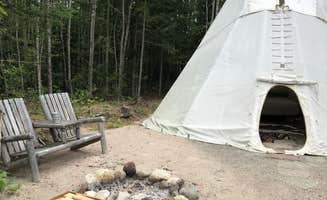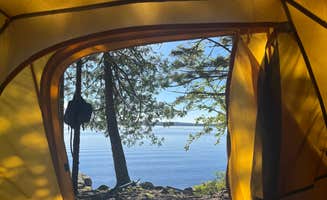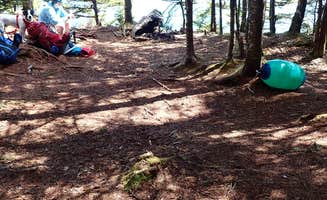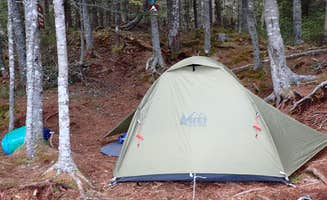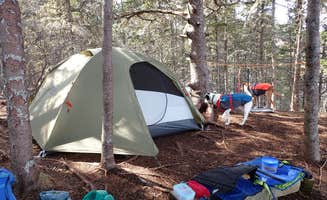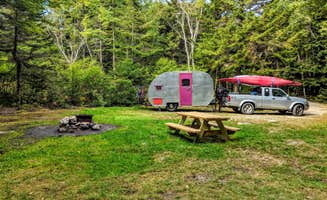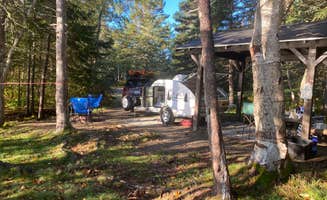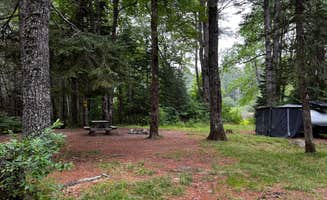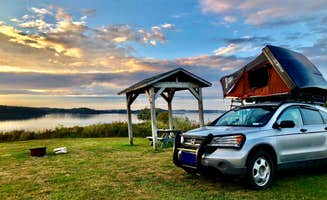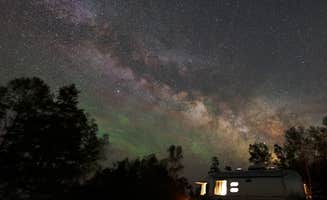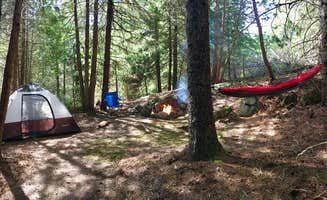The Downeast region where Roque Bluffs is located features dramatic tidal fluctuations that can reach up to 24 feet in some areas. Winter temperatures typically drop below freezing from December through March, while summer daytime temperatures average 70-75°F. Most primitive camping areas in this region lack potable water, so campers should plan to bring adequate water supplies or filtering equipment.
What to do
Kayaking and paddling: The coastal waters near Cobscook Bay State Park Campground offer excellent paddling opportunities with proper planning for tidal changes. "You can launch a kayak from your campsite, or from the large dock/boat launch area in the park. Kayaking should be done with prior research to ensure familiarity with the tide changes (which are up to 20 ft) and currents, which are strong and dangerous in certain areas of Cobscook Bay," advises camper Heather C.
Wildlife observation: The coastal region is rich with marine and bird life. "We saw many seals and cormorants in the water, as well as a few eagles," reports one Cobscook Bay visitor who noted the park's wildlife viewing opportunities from waterfront sites.
Hiking nearby trails: Cutler Coast Public Land provides challenging hiking with coastal rewards. "The coast of Maine offers very few places for overnight backpacking or even just seaside hiking. The Cutler Coast Public Reserved Land is one great option. The length of the hiking trails makes this the ideal, weekend getaway location for a two-night campout," notes camper Shari G.
What campers like
Waterfront accessibility: Campers particularly value sites that provide direct water access. At Sunset Point Campground, "There's a boat dock and a short trail along the coast with benches to watch the sunset," according to camper Janine B., who appreciated the waterfront amenities.
Privacy between sites: Many campers note the separation between sites as a major benefit. "The park is big, and many sites are very far apart - we had almost complete privacy. All sites have picnic tables and fire pits. The majority of the tent sites and small rv sites, and some larger rv sites, are on the water," explains a visitor to Cobscook Bay State Park.
Stargazing opportunities: The limited light pollution creates excellent night sky viewing. "It's been several years since our family stayed at this campground. We had a secluded site which sloped down to the bay. Very quiet and an incredible place to star gaze," notes Dan R. about his experience at Cobscook Bay.
What you should know
Reservation requirements: Most coastal campgrounds fill quickly during peak season. At Schoodic Woods Campground, "This is a tough Campground to get into. Reservations are almost a must," advises Dennis A., highlighting the competitive nature of securing sites.
Insect preparedness: Black flies and mosquitoes can be severe, particularly in early summer. "Between gnats and mosquitoes, sitting outside to eat is nearly impossible," warns a Schoodic Woods camper, suggesting the importance of proper insect protection.
Water limitations: Many primitive sites lack running water. A camper at Cutler Coast Public Land notes, "We did find some to filter but would recommend bringing at least 5L per person and another 2L or more depending on the size of your dog," emphasizing the need for water planning.
Tips for camping with families
Shelters and amenities: Some campgrounds offer unique accommodations beyond standard tent sites. Cottonwood Camping & RV Park provides novel options for families. "This is the first campground we have stayed at that has ATV trail access, horse friendly camping, full hookups, pull through sites, tent camping, tent rentals, teepee rentals, 'tiny bird cabin', and a tree house," reports camper J B.
Proximity to town services: Consider locations near small towns for supplies. At McClellan Park, campers noted, "Milbridge is the closest town, about 6 miles away and has all that you need while camping in the area," providing a safety net for families who might need to restock.
Bathroom facilities: Campground bathroom quality varies considerably throughout the region. "The bathrooms are dated but clean. There is a designated dishwashing drain to keep animals away from the campsites," notes a visitor to Blackwoods Campground, highlighting an important consideration for family camping.
Tips from RVers
Site access and size: Many coastal campgrounds have limited large RV access. At McClellan Park, one camper advises: "The sites are simple and rustic with a small spot for a few tents, fire pit and a picnic table. With just 12 sites, the campground can only accommodate a few larger RV's."
Hookup availability: Electric and water hookups are limited in the region. At Jonesport Campground, "Electricity is 30 amp and there is no sewer or potable water (so make sure you fill up before you come). Roads are gravel and have a few potholes," reports a camper who stayed there.
Seasonal considerations: Many RV parks close from late October through May. "We stayed in the 12th spot at the end and had an incredible time for a week stay. Cheap and perfect for any fellow boondockers," notes Mike T. about McClellan Park, a good option during operating season.


